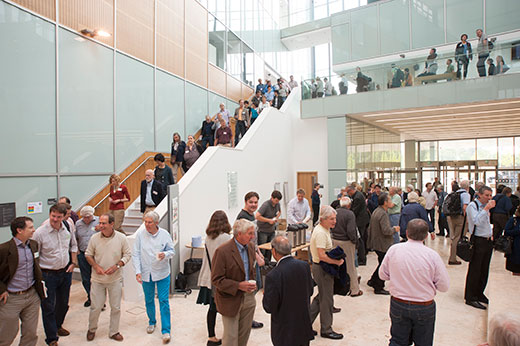Molecular Biology at 50 and beyond – LMB Alumni Symposium
The British Medical Research Council (MRC) Laboratory for Molecular Biology (LMB) in Cambridge recently celebrated its 50th Anniversary with a meeting for 600 former and present staff members. Aarhus University was represented by four former members of staff: Kjeld Marcker, Brian F.C. Clark, Peter Kristensen and Ditlev Brodersen – all now from the Department of Molecular Biology and Genetics.


Several current and former staff from the Department of Molecular Biology and Genetics have been working at the LMB.
Kjeld Marcker was the first to join the LMB as a staff member working with Fred Sanger. He was later followed by Brian Clark working with Francis Crick, Sidney Brenner and Aaron Klug. Julio Celis was a postdoc with Sydney Brenner - and later Hans Christian Thøgersen became a staff member with Aaron Klug. More recently, as postdocs, Bent Jakobsen worked with the present Director Hugh Pelham, Peter Kristensen worked with Greg Winter, while Ditlev Brodersen worked with Venki Ramakrishnan. Daniel Otzen worked with Alan Fersht while studying for his PhD. Nobel Prize Winner Tom Steitz moved from the LMB to Yale University where Poul Nissen was a successful postdoc. This shows the high level of scientific contacts and international reputation that Aarhus University has.
The basis of the laboratory was a collection of outstanding scientists, not in the university, externally funded. These scientists, working without having to apply for grants, started the succession of Nobel Prizes in Chemistry or Medicine, now totaling 20.
As part of the Cambridge college system, Brian Clark had short weekly supervisions with Greg Winter. Later, Greg Winter and Alan Fersht developed the science of protein engineering. The discovery of monoclonal antibodies although not patented stimulated the minds of such young scientists: Greg Winter successfully developed the method of humanised antibodies for clinical application. Two of these – humira and avastin – were sold to Astrazeneca and Hoffmann-La-Roche. Together in 2013 they sold for over 17 billion dollars giving a substantial income to the MRC so that the expenditure on the new LMB (over 300 million pounds sterling) was a minor part of the government income. This development from Greg Winter’s basic research has made him the most successful tech- transfer scientist in biological science.
The LMB has continued to employ young researchers as group leaders with full financial support and freedom to choose research topics. This method has excluded foreign financial intervention.
- More information about the symposium
- More information about the MRC Laboratory for Molecular Biology
Further information
Professor Emeritus Brian F.C. Clark
Department of Molecular Biology and Genetics, Aarhus University
bfcc@mb.au.dk - +45 4046 3410
